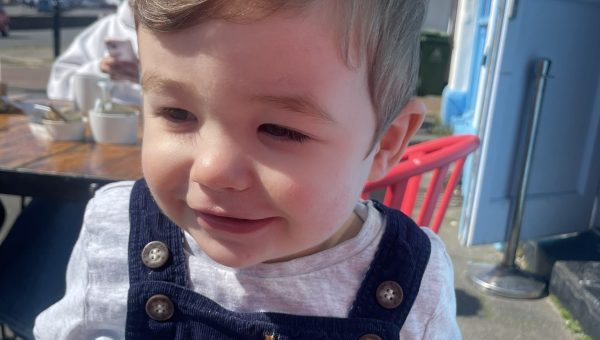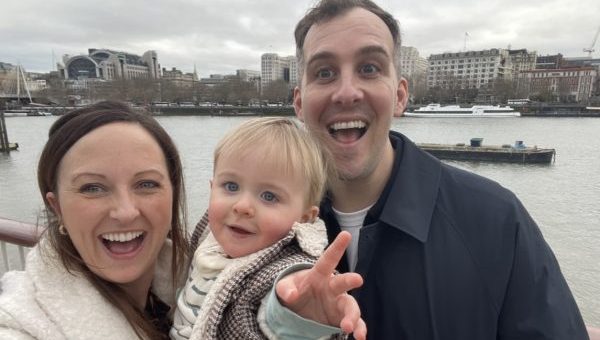We had a whirlwind with Jenson.
When he was just two and a half months old he became poorly out of the blue. He was vomiting a lot and seemed lethargic. As a first-time mum I didn’t have a clue what was going on and after taking him to the doctors, I left thinking he had a urinary tract infection. As the day passed though, he stopped feeding, and his nappy was completely dry. I went back to the doctors that evening and was told to take him to our local hospital, Hinchingbrooke.
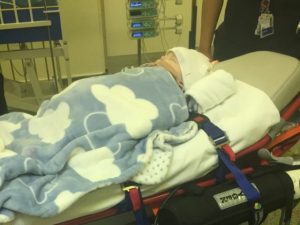
James, my partner, and I got to the hospital in the nick of time – as we walked into a room on the holly ward, Jenson went floppy in my arms. I remember it like it was yesterday, standing in the corridor, holding him and shouting for help. A nurse came running over to us and just like you see on TV, she pulled the emergency buzzer and loads of doctors and nurses came in. They swiped Jenson out of my arms and laid him in the hospital cot whilst a nurse took us to one side. After what felt like a lifetime they stabilized him and talked us through what was happening. At the time, they couldn’t tell us what was wrong with our baby but that he was seriously ill.
Jenson was put on oxygen for the evening and you could see he was fighting so hard. I didn’t think it was possible but the next day was even worse – Jenson started struggling to breathe. He fought so hard but after a long day struggling, the doctors decided to put him into an induced coma to help his little body rest and help him battle a suspected respiratory infection. Hinchingbrooke were unable to provide the additional care he would need and so he was transferred to Addenbrooke’s Hospital in Cambridge by The Children’s Acute Transport Service (CATS)
“I still remember our bedroom. It was the time we were most worried and its homeliness really stands out. It was so reassuring to know we had a place to stay while our little boy was so poorly. We still to this day really appreciate it.”
When we arrived we were asked to sit in the family room by the Paediatric Intensive Care Unit (PICU) while they attached him to the machines that would help save his life. It had been such a mad day and we tried to figure out what was going on, but it was horrendous. Not having ever been into an intensive care unit, I always thought people that go in, don’t make it out.
As we sat there with our thoughts, a nurse popped in to tell us not to worry about where we’d stay. She handed us the keys to a place called Acorn House and told us to take our stuff across there.
Even though it was such a long time ago, I still remember our bedroom. It was the time we were most worried and its homeliness really stands out. It was so reassuring to know we had a place to stay while our little boy was so poorly. We still to this day really appreciate it.
As babies are small, contracting a respiratory virus like Jenson did can really make them very ill. Their immune systems just can’t fight it and they can’t deal with it. Jenson remained in an induced coma for five days and during that whole time we were able to stay just minutes from his bedside.
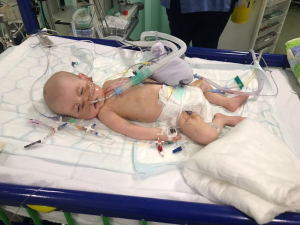
We’d wake up at 6am in the room, get ready and have a shower. It was so important to have that time to refresh, before or after a day on the wards as it was exhausting. From there we’d leave Acorn House and sit by Jenson’s bedside all day. 12 hours later we’d return to Acorn House. It was the only break we got, and we could have that because of The Sick Children’s Trust. On getting back to Acorn House, we’d heat up some food our families had prepared for us and enjoy it at the dining table. We’d then go to bed and get a good night’s rest, which we could because we knew if anything did happen to Jenson we could be there in minutes.
As Jenson was being brought out of his coma, I noticed that his heart rate was faster than expected but we were reassured that it was more than likely fine and just high as he was still fighting off the bronchiolitis. We eventually were able to take him home just before Christmas 2017 and tried to put the whole experience behind us.
“We’d go to bed and get a good night’s rest, which we could because we knew if anything did happen to Jenson we could be there in minutes.”
After being discharged from Addenbrooke’s, Jenson never seemed to get better. He used to have what I called ‘episodes’ where he’d scream, be sick and then almost pass out. I took him back to the hospital, but they put it down to reflux. Jenson also failed to thrive and was not gaining weight but doctors dismissed our concerns as they thought it was due to being so poorly with bronchiolitis and that it would just take a little while to recover.
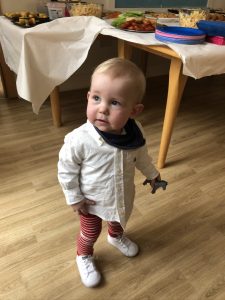
In February 2018, we took Jenson swimming and again he went floppy. We rushed him to hospital, again in the nick of time, and we discovered the cause of all of Jenson’s problems – it was his heart. We were transferred to the Evelina Children’s Hospital in London where they found that he had a rare congenital heart defect called Cor Triatriatum – where a membrane grows around an atrium causing an extra chamber in the heart. For Jenson, this appeared in his left atrium and it was slowing his blood supply, which meant his heart was working harder. By the time of his surgery, the membrane had grown so much that the hole that was allowing blood to flow through was the size of a pinhead. Our surgeon said we must have had a lucky star with us that day!
This time we knew what to expect walking into PICU. When you’ve been through it once, you know you can survive it. While Jenson underwent open-heart surgery and recovered from it, we were given accommodation in both the hospital and at Ronald McDonald House Charities, which was amazing.
We were told that only 1 in 140,000 babies born each year with a congenital heart defect are diagnosed with Cor Triatriatum. His case is so rare that the surgeon kept the membrane that was removed in his surgery for students’ training. Some of the nurses that cared for Jenson in PICU even asked us to explain his condition, as they hadn’t heard of it before – at a heart hospital!
As far as heart conditions go, Cor Triatriatum is a better one to have – as it is usually a one time fix. Jenson is now a thriving, typical little boy and will just have to have regular checks throughout his life. We were unlucky to experience what we have, but at the same time we know we are lucky to have come out the other side. We met lots of families whose children have had multiple heart and other surgeries in their short lives and would unfortunately need more.

Jenson is doing amazing which is really reassuring, and every day we remember those that helped us during our time in hospital. Over the years we have raised money for The Sick Children’s Trust and attended their Make the Children Smile parties. We even bumped into the family who were in the intensive care bed next to us. It was really nice to see that family again, a person who was going through the same horrific experience as we were and then to be able to see them on the other side was amazing.
Abbie Harrison, Jenson’s mum

